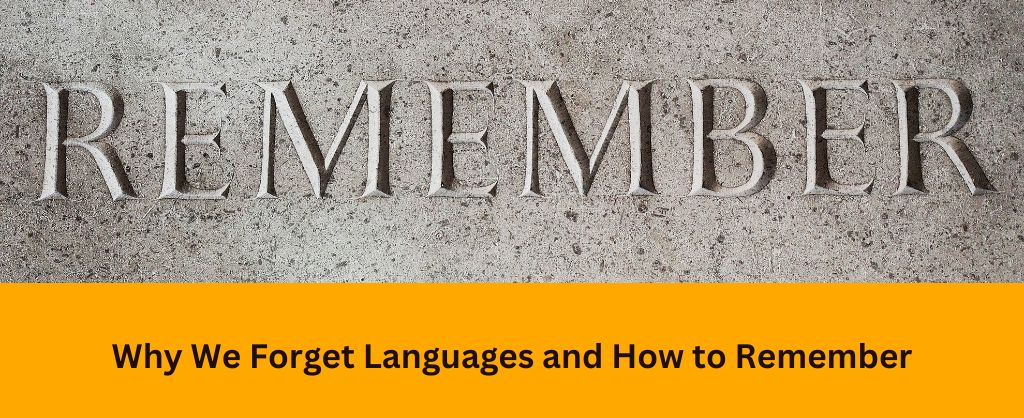Why We Forget Languages and How to Remember: A Complete Guide

Raise your hand if you took years of Spanish classes but now struggle to order food at a Mexican restaurant. I feel you. Or maybe you lived in France for a bit and loved it but have since lost your je ne sais quoi. No judgement here.
The reality is most folks forget a foreign language eventually. Life moves on, and without constant upkeep, those new words and grammar rules fade fast.
But we don’t have to accept forgetting as inevitable!
In this post I’ll share the top reasons we tend to lose foreign languages and equip you with simple tactics to maintain your hard-won language skills.
Not Using It = Losing It
Hands down the #1 reason we backslide is not using the language enough. Just like going to the gym or playing an instrument, languages get rusty without regular exercise.
To keep your skills sharp:
- Set a goal to practice your target language daily, even if just for 15 minutes. Listen to music, watch a show, or narrate your day out loud.
- Have set times each week to read, write, speak, and listen in the language. Make it a habit!
- Schedule regular conversation sessions with native speaking partners.
The key is to incorporate the language into your regular routine, not just leave it inside the classroom. Because the truth is, use it or lose it is 100% real when it comes to foreign languages. Interacting in the language directly prevents vocab, grammar, pronunciation and more from slipping away.
So put your skills into action regularly! Here are some easy ways:
- Listen to a podcast or music in the target language during your commute
- Follow social media accounts that post in the language so you see it daily
- Label household objects with sticky notes in the language to practice whenever you’re home
- Change your phone or laptop settings to the language so you’re using it passively throughout the day
- Keep foreign language books or magazines in your bathroom and read for a few minutes each day
- Watch TV shows or YouTube videos in the language while eating dinner or winding down from the day
Even just 15-30 minutes daily of passive or active practice makes a big difference. The key is consistency. Don’t let too many days go by without some kind of exposure to keep those neural pathways fresh.
Of course, listening and reading are important, but speaking and writing actively exercise different language muscles. Make sure to do output as well as input.
Ways to practice output include:
- Narrate your actions out loud in the language as you cook, clean, get ready in the morning, etc.
- Think through your schedule, plans, or tasks for the day in the language
- Dictate texts, emails, or voice memos to yourself in the language
- Practice conversing with a language partner or chatting with strangers on language exchange apps
- Post written content on social media or submit stories to language learning platforms
The more you flex your speaking and writing muscles, the more primed they’ll be when you need them for real-world interactions. Output drives long-term retention.
Lastly, interactions with human beings are incredibly valuable. Our brains perceive conversations differently than consuming content passively. The social element engages us more deeply.
Passion Fizzling Out
That rush of excitement when first diving into a language is thrilling! But let’s be real: no one can sustain that highly-motivated phase forever.
After a few weeks or months, frustration starts to set in. Vocab lists aren’t fun anymore. Strange grammar rules seem illogical. You still can’t understand native speakers at full speed.
This is the point when many language learners start to lose steam and backslide. So how can we rekindle the passion before it’s too late?
Make It Enjoyable
We’re all more likely to stick with things that we find fun and enjoyable. After all, happiness is a key driver of motivation.
Start by reflecting on what drew you to this language initially? What excited you about the culture, travel opportunities, connecting with new people, or sound of the spoken language? Try to reconnect with the joy of discovery you felt at the beginning.
Then look for ways to inject more lighthearted fun into your current study routine. Here are some ideas:
- Learn through music, shows, or movies instead of textbooks
- Incorporate games, trivia, and friendly competition
- Form or join a study group for social accountability
- Teach the language to friends to test and solidify your knowledge
- Play language learning apps that make studying feel like a game
- Research cultural celebrations, food, travel destinations or other interests related to the culture
- Follow fun social media accounts in the language like meme pages, influencers, artists, etc.
When your studying starts feeling like drudgery, switch it up! Don’t be afraid to try new approaches until one sparks your interest again.
In addition to making existing study methods more enjoyable, it’s important to branch out and explore new resources.
Here are some to consider:
- Streaming shows in the language
- YouTube channels by natives on topics you enjoy
- Music playlists with lyrics so you can read along
- Podcasts ranging from casual chat to scripted dramas
- Language learning apps with short lessons optimized for engagement
- Social media personalities who regularly post content in the language
- Local Meetups or classes offering immersion experiences
- Conversation partners who become friends
This variety keeps things exciting! Each resource brings a fresh perspective and style.
Don’t limit yourself only to traditional textbooks or class formats. Branch out and take advantage of the incredible amount of authentic content readily available these days. Thinking outside the box pays off in enjoyment and retention.
Revisit Your Purpose
When your zeal starts to lag, the most powerful motivator is reconnecting with your core purpose for learning the language.
Start by asking yourself:
- Why did I decide to learn this language in the first place?
- How will fluency impact or enrich my life?
- What doors will it open up professionally, personally, or spiritually?
- What experiences do I hope to enable by speaking this language?
Really take time to step back and remember the “why” behind your decision. At the beginning, this purpose likely felt crystal clear. But under the weight of grammar drills, it can be forgotten.
Make this WHY bigger than just achieving a goal. Align it to personal values, future dreams, professional ambitions, or relational aspirations. When the purpose seems bigger than yourself, you’re more likely to persist.
When frustration mounts, re-read the WHY you originally wrote down. Does it still ring true? If not, take time to redefine your purpose until it re-ignites your commitment. A clear sense of purpose powers perseverance.
Maintaining Motivation is Key
Learning a language takes several years. Without sustained motivation and enjoyment, it’s unlikely you’ll stick with it long enough to achieve fluency.
Make the journey fun, feel ownership over your goals, surround yourself with encouraging community, and continually realign with your WHY.
If you can master motivation, you can master the language – even when those vocabulary lists eventually stop seeming exciting. Don’t give up!
Okay, let’s move onto the next major factor for forgetting languages – depending too much on translation.
Depending Too Much on Translation
When learning a foreign language, translation seems helpful at first. If you don’t know a vocabulary word, just plug it into Google Translate, right? Seems easy.
But constant translating becomes a crutch that actually hinders long-term retention and fluency. Here’s why it’s better minimized:
Prevents Thinking in the Language
The goal is to train your brain to incorporate the patterns, vocabulary and structures of the new language. But if you always revert back to your native language, this short circuits the adaptation process.
You stay trapped thinking first in your default language, then converting. This slows you down. Over time, you want direct associations to form between the foreign words/grammar and concepts. No translation middleman.
It takes patience, but the more time you spend immersed in the new language WITHOUT translating, the more your brain adapts to thinking in it directly.
Creates Dependency on Native Language
When we immediately get a translation for every new word, it feeds an unhealthy dependence. The brain grows accustomed to having meanings handed to you.
This prevents you from picking up on contextual clues, listening for cognates, dissecting word roots, or decoding overall meaning through intonation and body language. Those are key skills!
By never pushing through any confusion or ambiguity, you deny yourself the chance to make breakthroughs. Tolerating uncertainty trains your brain to persist through challenges and make connections.
Don’t use translation as a way to rescue yourself when new words or structures seem intimidating. Stick with it! Even if you don’t understand every detail, absorbing patterns trains your ear and intuition over time.
Prioritizes Exact Meanings Over Big Picture
Obsessing over the precise English translation of each word keeps you focused on the trees instead of the forest. You get hung up on minor details instead of listening for overall meaning.
In real conversations, you must rely more on context clues and listening for gist instead of understanding every single word perfectly. Fluency means focusing on big picture communication, not microscopic accuracy.
So avoid letting the endless quest for exact meanings sabotage your ability to understand the essence of what’s being conveyed. Let some of the finer nuances go, especially as a beginner.
Hurts Listening and Speaking Skills
Here’s the bottom line – translating happens largely through visual means like dictionaries, Google, books, etc. But conversations happen through listening and speaking.
If you depend too much on reading/writing translations, you neglect building critical real-time comprehension abilities. Your ear and mouth don’t get enough exercise.
Make sure to balance translation crutches during self-study with listening to and speaking the language live as much as possible. The more auditory exposure and vocal practice you get, the faster true fluency develops.
Taking On Too Many Languages at Once
In our enthusiasm to learn a new language, it can be tempting to add several more. The appeal of becoming a polyglot is strong!
But attempting too many languages simultaneously rarely produces solid results. Here’s why it’s not recommended for beginners:
Divides Up Mental Bandwidth
Learning a language well requires an immense amount of information absorption, pattern recognition, memorization, and skill building. Your brain needs focused time and energy to make progress.
When you divide up that mental bandwidth across multiple languages, none get the dedicated attention they need. You stay constantly stuck at a surface level instead of diving deeper.
It’s better to be fluent in one or two languages than just dabble at a basic level in many. Depth beats breadth early on.
Causes Confusion and Frustration
Each language has its own patterns, grammar conventions, sentence structure, pronunciations, vocabulary nuances, etc. Trying to juggle multiple rule systems at the same time is massively confusing.
Even languages from the same family (like French and Spanish) have key differences that make simultaneous learning super hard. Keeping everything straight becomes frustrating fast.
When you focusing on just one language, concepts build systematically without interference. You develop strong foundations that make adding languages later much easier.
Slows Down Overall Progress
Reaching proficiency in any language takes hundreds or thousands of hours over several months or years. Dividing up your study time across multiple languages means slowing down progress in all of them.
Instead of having chunked periods of deep, focused learning, you end up with fragmented, inconsistent practice. It’s tough to retain what you learn when constantly shifting gears and coming back to review.
Sticking with one language allows you to completely immerse yourself and take in information methodically. You’ll likely reach conversation faster focusing on just one language at first.
Neglects Any One Language
Often when people try to learn multiple languages simultaneously, they make varying levels of progress in each before moving onto the next novelty.
Maybe your Spanish is coming along well but your Mandarin has stalled out. So you add Italian into the mix alongside the others. This cycle of starting hot then neglecting older languages continues.
Rather than hopscotching between languages constantly, commit to one through the intermediate level first before experimenting with another. See one language journey through to a sense of mastery instead of a perpetual cycle of new beginnings.
Not Circling Back to Review
Imagine you just finished Unit 5 of your language course, packed with fresh vocabulary, verb tenses, and grammar concepts. You celebrate mastering this material and dive right into Unit 6.
But here’s the problem – without circling back to reinforce those older lessons, they’ll quickly disappear from memory. Out of sight, out of mind.
That’s why building review into your regular study schedule is so critical. Here’s what consistent revision accomplishes:
Strengthens Existing Knowledge
Rereading chapters, re-watching lessons, repeating flashcards – this repetition converts new info into reliable long-term knowledge.
Through spaced intervals of review, your brain has the chance to make connections stronger and recall faster. Retrieval practice through review cements things in place much more effectively than passive study alone.
Don’t just cram new info constantly. Reinforce older lessons frequently and meaningfully.
Identifies Knowledge Gaps
Maybe you thought you knew those irregular past tense verbs cold. But when you go to conjugate them during review, you stumble.
This tells you precisely which areas need more practice instead of guessing. Pinpointed weak spots can then be targeted through additional focus, rather than neglecting them and hoping for the best.
Regular review reveals where your knowledge is shakiest. You can’t strengthen what you don’t assess.
Prevents Forgetting Through Disuse
Like any skill, languages deteriorate without practice. Coming back to earlier vocabulary, verb forms, and grammar principles counteracts the “use it or lose it” effect.
Think of it like revisiting songs on an old guitar. Review dusts off the rust and gets things moving again. Don’t let past knowledge waste away in storage. Recall it frequently.
Strategies to Incorporate Review
Hopefully you’re convinced regular review is essential! Here are some strategies to seamlessly build it into your routine:
End Each Study Session By Revisiting Older Material
- Spend the last 5-10 minutes of every session doing quick review. Flashcards, practice exercises, looking over old notes, etc. Just a little tastes helps.
Use Spaced Repetition Flashcard Apps
- Apps allow you to practice recall at gradually increasing intervals based on performance. Easy to build in quick review daily.
Schedule Time Each Week Dedicated Only To Review
- Make it a habit to focus at least one study session per week solely on old material. This concentrated dose strengthens retention.
Incorporate Old Lessons When Learning New Ones
- Mix in some review of verbs from Unit 1 when you learn Unit 7 tenses. Integrate vocab from Chapter 4 into Chapter 8. Blend old with new.
Occasionally Do Entire Review Weeks
- Take a break from new lessons entirely and devote a whole week to revisiting past material. Immerse yourself back in the foundations.
Re-read/Re-watch Older Lessons Before Starting New Ones
- Quickly skim back through the previous lesson or chapter before moving forward. Remind yourself what was just covered.
Expecting Too Much Too Fast
When we start learning a new language, so much excites us. The sounds, writing systems, cultural wisdom encoded in the vocabulary, the thrill of decoding meaning – it’s a high!
In our enthusiasm, it’s easy to cast vision for the day when we’ll:
- Chat effortlessly with native speakers
- Understand movies and songs
- Read novels and news articles fluently
- Travel confidently in foreign countries
- Make international friends
These aspirations fuel our motivation. But envisioning only the end goal can set us up for frustration when the journey gets rocky. And language learning is a long, gradual process requiring consistent practice over years.
Unrealistic expectations around the pace of progress lead many aspiring polyglots to abandon their efforts. Here’s what more realistic expectations involve:
It Takes Hundreds or Thousands of Hours
Research shows it takes approximately 600 hours of study to reach basic conversational proficiency in languages like Spanish or French for native English speakers.
And over 2,200 hours are needed to achieve advanced mastery of Chinese, Arabic or languages farther removed from English.
This doesn’t necessarily mean hundreds of hours of tedious drilling. It could be chatting with native speakers, reading enjoyable books, watching TV shows, or other immersive activities.
But the point remains: language acquisition is a massive time investment. Expecting to “be fluent” after a few weeks or months of Duolingo is unrealistic. There are no shortcuts.
Of course, the exact number of hours depends on factors like:
- How closely related your native language is to the one you’re learning
- Consistency of practice time
- Methods and resources used
- Opportunities for immersion
But no matter how optimized your strategies are, allow significant time. Attaining any complex skill takes serious hours.
Don’t Compare Yourself to Polyglots on Social Media
It’s tempting to watch videos of people speaking 6 or 10 languages fluently and get discouraged. But remember, comparison is the thief of joy.
Some people have natural linguistic talents or photographic memory. Others have been chipping away at languages for decades. Don’t measure your Day 1 to their Day 10,000.
Focus on competing with yourself, not others. Are you improving versus one month ago? One year ago? That’s all that matters.
Each person’s language learning journey is unique. Don’t let “highlight reels” dishearten you. Celebrate your own small victories.
Not Addressing Weaknesses
When learning a language, we all have stronger abilities and weaker ones. Maybe you shine at reading and writing but listening comprehension trips you up. Or your vocabulary is robust but putting sentences together baffles you.
It’s tempting to avoid our linguistic weak spots and focus on what comes more naturally. But letting vulnerabilities languish leads to major issues down the road.
Here’s how to turn weaknesses into strengths:
Identify Your Weak Spots
First, objectively assess your current language abilities. What exactly are your weakest skills? Common trouble areas include:
- Speaking fluency
- Listening comprehension
- Proper pronunciation
- Expanding vocabulary
- Perfecting grammar
- Reading speed and fluency
- Writing coherently
- Building confidence to use the language
But your challenges are unique to you. Ask trusted teachers or fellow students where they notice you struggling most. Or use a structured assessment tool to diagnose relative strengths and weaknesses.
Awareness of the precise areas holding you back is key. Don’t hide from the truth.
Design a Plan to Improve Weaknesses
Once you’ve spotlighted specific soft spots, devise a plan to turn them around.
If listening comprehension is lacking, commit to watching a TV show in the language several times per week while reading subtitles.
If vocabulary feels inadequate, set a goal to learn 20 new words per day through flashcards.
If speaking confidence needs a boost, find language partners for regular low-pressure conversation sessions.
Come up with tailored activities to directly target your vulnerabilities. This transforms them from obstacles into opportunities for focused growth.
Conclusion
We’ve covered a lot of ground on the key pitfalls leading to language attrition and techniques to maintain fluency long-term. Let’s recap the core lessons:
- Use your skills actively through reading, writing, speaking, and listening or risk losing abilities from disuse
- Stay motivated by making language learning fun, tracking small wins, finding community, and reconnecting to your WHY
- Minimize dependence on translation tools so your brain can adapt to thinking directly in the new language
- Build a firm foundation in one language before adding another to avoid split focus
- Incorporate regular review of past material alongside learning new concepts to cement gains
- Keep patience through the initial struggles and celebrate small milestones along the journey
- Identify and confront weaker areas aggressively through targeted practice and support
Language learning is a lifetime adventure requiring sustained effort and passion. But with the right mindset and strategies, forgetting doesn’t have to be inevitable. You have the power to retain your hard-won language skills for the long haul.
















